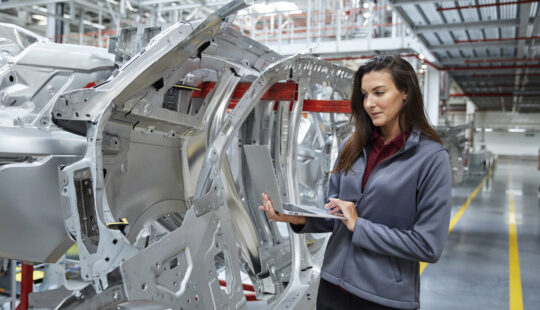In the worldwide effort to slow the spread of the coronavirus, grounded flights, emptied highways, and shuttered factories caused global carbon dioxide emissions to fall to levels not seen since 2006.
However, while the positive environmental side effects of the pandemic spurred hope for a “green shift” in our global economy post-pandemic, we are at a turning point when it comes to curbing climate change. The dip in greenhouse gas emissions last year accumulated “only” to a seven percent decline with signs of returning to pre-pandemic levels already. While encouraging, this will not bring us any closer to the long-term deep decarbonization pathway needed by 2030. A systems change is needed. We need to rethink our economy.
Companies are increasingly under the spotlight regarding their societal and environmental impact. Not only must capital market-oriented companies in many countries provide information about non-financial aspects of their business activities. Also, consumers today aren’t just making decisions based on products or price but are more willing to buy from and work for companies that are taking a stand on current and broadly relevant issues like climate, sustainability, transparency, and social justice such as fair employment practices.
Sustainability is no longer optional, but has become key to the long-term success of any business. It’s about defining new competitive advantages, lowering risks, building resilience to pricing regulations, gaining ground with investors, and being ahead of emerging consumer demands. As a result, we see sustainability becoming a central dimension of corporate decision making, just like cost or growth.
Across all industries, digital technologies can help reduce huge amounts of greenhouse gas emissions and natural resource consumption. However, no single company can develop all the solutions and technologies that are needed. Businesses across all sectors are actively pursuing joint opportunities to progress with their decarbonization goals. The energy industry is no exception to this. It is increasingly working with customers, governments, and others to help address carbon emissions in different sectors, jointly developing innovative solutions to help accelerate energy transition.
The recent wave of 2030 to 2050 “net-zero” ambitions being announced from major oil and gas players does signal a willingness to address climate action in their core business model. But as demand for hydrocarbon-based energy flattens — and eventually declines — these companies need to look at all aspects of how they do business and redefine their long-term business models in a hydrocarbon-constrained world.
Based on my conversations with many customers from this industry, it becomes clear: they want to evolve faster. But how can they navigate a shifting strategic landscape, still dependent on the old business model, while providing returns to shareholders through an accelerating energy transition – and in this not only survive but thrive?
The fact is, no company can take this journey alone. Working together can help transform challenge to opportunity. We are here to work with our customers to achieve new long-term sustainable business models, using intelligent technologies such as the Internet of Things (IoT), machine learning, artificial intelligence (AI), blockchain, and advanced data analytics to both optimize operations and reduce emissions.
It starts with the fundamental integration of sustainability data into business processes across all industries and across all value chains. By helping our customers and suppliers across industries to take the first steps to embed carbon emissions tracking and management into everything, everywhere, all the time – in operations, in supply chains, in products, even into employee activities – the foundation for 2030 ambitions will be set. They can make faster and responsible business decisions while taking sustainability into account. They can reduce and mitigate emissions. They can simulate options for sustainable investment, operational decisions, and managing natural and social resources, just like any other enterprise resource.
It is in this spirit that we are looking forward to collaborating with Shell, which has embarked on an industry-leading journey to transform its business. Shell’s carbon management approach focuses on avoiding, reducing, and then offsetting the unavoidable greenhouse gas emissions using technology and nature. We will partner to support the energy transition, explore carbon avoidance, reduction, and offsetting models, footprint tracking, and accelerate data transparency with further industry partners for a more sustainable business.
No doubt: Advancing toward a net-zero emissions future is one of the biggest challenges – if not the biggest – facing humanity today, and the clock is ticking. No company or country will be able to solve this alone. Industries, governments, and customers must work together to find ways to tackle carbon emissions. Digital technologies will be a catalyst to speed up and democratize innovation if used in partnership and responsibly.
Christian Klein is CEO of SAP SE.
This story was originally published on LinkedIn.



